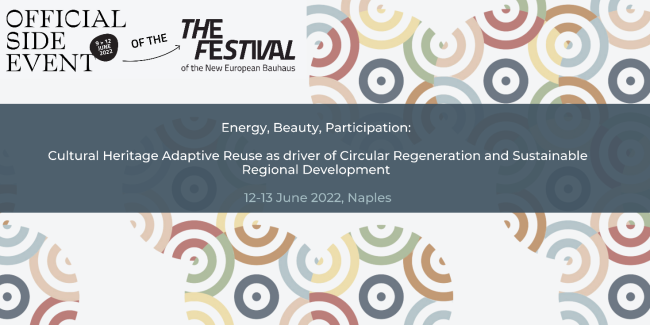
On 12 and 13 June 2022 the Institute for Research on Innovation and Services for Development of the National Research Council of Italy (CNR-IRISS) will host the side-event of the New European Bauhaus Festival “Energy, Beauty, Participation: Cultural Heritage Adaptive Reuse as a driver of Circular Regeneration and Sustainable Regional Development”.
The event, streamed on the CNR IRISS YouTube account (https://www.iriss.cnr.it/youtube), will consist of a sharing of results of European-funded research and innovation projects such as H2020 Be.CULTOUR and CLIC, coordinated by the hosting Institution, REFLOW, Open Heritage, as well as other international projects such as Charter and Cultural Heritage in Action, structuring a dialogue with policy makers, entrepreneurs and civil society organisations engaging them in the implementation of the circular human-centred model for urban and territorial regeneration.
The circular and human-centred economic model developed in the last years through European funded research can be the answer to cope with complex interconnected challenges, global geo-political crisis, as well as with the rapid changes occurring in the organisational structure of countries and territories, turning challenges into opportunities for our society. This circular model can and should be applied also to territorial regeneration, adopting a paradigm shift in which economic values co-exist and co-evolve with social/human values, thus allowing the implementation of a human-centred strategy for circular and sustainable territorial development. Instead than being a secondary element, cultural heritage has a pivotal role in addressing the current challenges As emphasized by a number of European Commission documents and policies (the New European Bauhaus itself, the European Cultural Heritage Green Paper, the European framework for action on cultural heritage, just to mention a few), cultural heritage recovery and adaptive reuse can become a driver of economic and social regeneration at local level supporting jobs creation, social cohesion and maintenance through building construction activities, cultural tourism, cultural and creative activities, local social economy, RD&I and knowledge economy. At the same time, cultural heritage and cultural landscape, through the implementation of circular models, can contribute to address climate change, fostering the ecological transition and the achievement of the European Green Deal objectives, as well as to enhance the beauty and attractiveness of cities and regions, generating positive impacts on the entire community, also in terms of wellbeing and increased quality of life.
These are the main topics the event will focus on, conceived as an opportunity to deepen projects’ themes, which will be discussed by speakers from different project partners and international networks of cities and regions such as ICLEI and ERRIN which will discuss the challenges for the implementation of the circular city from the point of view of local governments. In addition, the debate will be intended as an opportunity for comparison with international organisations interested in cultural heritage such as ICOMOS.
As evidence of the enormous potential of circular human-centred development model, on Sunday, June 12, the international speakers will be accompanied to a guided tour to the Catacombs of San Gennaro, an archaeological site/religious heritage located in one of the most densely populated and characteristic neighbourhoods of Naples, the “Rione Sanità. The Catacombs represent a perfect example of social regeneration strategy where the recovery of a cultural heritage site has launched a cultural, social and economic revolution promoted by local people with an intervention of social inclusion and enhancement of a common good for the development of a community in a particularly difficult area.
The conference will start on Monday 13 June, at 9.45 CET. Opened by Massimo Clemente, Director of the CNR-IRISS, the debate will be enriched by the contributions of a number of international speakers including, among the others, Andrew Potts, ICOMOS Climate Heritage initiative, who will discuss about the potential of arts, culture and heritage for realizing climate resilient futures.
